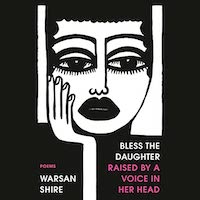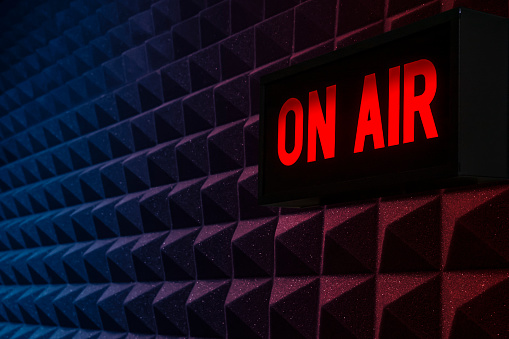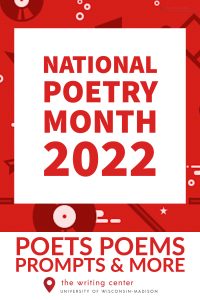POETRY SPOKEN STATESIDE
POETRY SPOKEN STATESIDE
Norman Warwick learns more from Alexis Gunderson on line

Alexis Gunderson (right )is a TV critic and audiobibliophile. She is a regular contributor to Paste magazine,, reading of choice in our office, and Alexis can be found @AlexisKG.
Before going on to discuss a selction of best audio poetry books available at the moment, Alexis began her preview of National Poetry Day with a point on which I absolutely concur.
National-anything months, for anyone who works on media round-ups like we do here at Paste Books, can be a real Catch-22. Sure, it’s good to highlight the Best Poetry Audiobooks in the middle of National Poetry Month, but where does that leave the idea of reading—or in this case, listening to—poetry collections the rest of the year? Alliteration, assonance, and formal playfulness don’t only resonate in April, after all.
What’s more, while every genre suffers from the fact that there’s just too much being published for even a fraction of the best titles to be given the spotlight they deserve, the capacity poetry has, as a genre, to create cultural sparks with even the slimmest of collections means that for every deserving title we might manage to highlight here, a dozen more might have been swapped in.
Alexis, concerned but undaunted, went ahead and offered her first nomination of the best audio poetry books around at the moment.

Truly: For every Felon, there’s a Finna; for every glittering new release from Warsan Shire, there’s an equally lambent new collection from Ocean Vuong. Maybe you’re a fan of Clap When You Land and Long Way Down in search of a new YA novel in verse? Well, have you tried Kip Wilson’s The Most Dazzling Girl in Berlin, or Amber McBride’s Moth, or Ibi Zoboi and Yusef Salaam’s Punching the Air, or even (to age up enough to drop the Y from YA) Sarah Crossan’s Here is the Beehive? Or maybe you’re someone who doesn’t have the patience for books, in which case we might recommend the On Being Project, from Kristen Tippett’s meditative podcast of the same name, and leave you with more hours of gorgeously collected short-form poetic audio content than you could get through in a lifetime.
The point is, there is no end to the richness you can find when stepping into the world of poetry, never mind poetry translated specifically with the aural/oral tradition in mind. So while we hope you’ll celebrate National Poetry Month 2022 by starting with one of the titles listed below, we hope just as deeply that you’ll use that listening experience as a reason to seek out even more poetic audiobooks down the road.
Because poetry—it’s meant to be heard.
I wonder how much Alexis, or any or all of us are swayed by the title of any poetry compendium. I certainly loved the title of her next selectiom.

Whether you recognize her from her Lemonade-era collaboration with Beyoncé, or from her viral 2016 poem, “Home” (no one leaves home unless home is the mouth of a shark), if you’ve been even a little bit “online” in the past few years, you already know Warsan Shire. In fact, judging by the sheer length of every holds list I have access to on Libby for the British-Somali poet’s first full collection, for Bless the Daughter Raised by a Voice in Her Head, you not only already know Shire, but you’ve already got her on your TBR.
Still, allow me two beats to recommend the audio version of Bless the Daughter…, which Shire performs herself. Quiet, warm, and almost meditative, the softness of Shire’s voice constantly snags the listener’s attention with how sharply the delivery contrasts with the violence and trauma she is writing about. Just as critically, the pop culture catchphrases of Western teen girlhood that Shire uses to frame so many of her poems—from “Are you there, God? It’s me” to “At first I was afraid, I was petrified” to “My loneliness is killing me”—desperately need the careful specificity of her delivery for the listener to dissociate them from their deep pop roots.
I will allow that one advantage the printed edition does have over the audio is that it gives the reader ready access to the glossary Shire provides at the collection’s end. But honestly, going in unmoored from many of the terms Shire uses to build her poems is a valuable experience on its own—and then once you’ve listened to the glossary all the through, the brief one hour and seven minutes will be ready for you to listen through again, new understanding firmly in place.

Felon: Poems by Reginald Dwayne Betts: Though clocking in at barely more than an hour long, Reginald Dwayne Betts’ Felon: Poems is one of the rangier, more expansive collections on this list. Jumping back and forth in time, back and forth in place, back and forth, even, in style, the titular poems bleed into meditations, bleed into what Betts calls “Essays on Re-entry.”
As narrated by Betts, whose sharply moderated, thoughtfully rhythmic pace echoes the formal repetition used in the poems, themselves, the collection as a whole opens a door for the listener to understand, on a more visceral level, the tedious (and explicitly racist) inhumanity that has so long propped up America’s obsession with incarceration. Punctuated judiciously, on top of all that, by Reed Turchi’s bluesy, distorted slide guitar soundscape, the audio version of Felon is a must-listen.
When a selection of poetry such as this includes the national Poet Laureate, it cannot help but attract attention, especially when the work of that laureate is ´so inherently musical´.
U.S. Poet Laureate Joy Harjo’s work is so inherently musical that, even in the poems that don’t explicitly include snippets of song or ritual chanting, it’s nearly impossible for her to get through a single track on her 2020 collection, Conflict Resolution for Holy Beings, without slipping into a kind of rhythmic sing-song.
That as much of her work in this collection uses jazz saxophone and the blues as framing devices on Conflict Resolution’s figurative path down the Trail of Tears as it does the stomp dance songs of Harjo’s ancestors should come, then, as no surprise. Beautifully paced and deeply felt, this is one of those collections where, honestly, the idea of not listening to it on audio would feel sacrilegious.
As if her selections needed more grandeur for validation, Alexis also put in her list the name of a poet who has spoken at a Presidential Inaugurations.

After her luminous performance at President Biden’s 2021 Inauguration, Amanda Gorman hardly needs us to boost her well-deserved reputation as one of America’s most exciting young poets. And yet, her recently released collection, Call Us What We Carry, is so extremely good in its audio form that we’d be remiss not to include it on this particular list.
Performed with an accessible Midwestern plainspokenness by Gorman herself, the poems in Call Us What We Carry capture the current chaotic moment in American (and human) history in a way that is compelling without being overwrought. Longer than some of the other collections on this list, this listen may be best experienced in small bites, but let that be a draw rather than a deterrent. Gorman’s words are rich enough to fill whatever space you leave between those bites.
Having seen the USA poet Laureate and that of a Presdential Invitee Alexis´ list I was then very pleasantly surprised to see her include the name of our UK Poet Laureate. I was taught by him in my university days at Leeds and Simon seemed to me to not only poems as poems should be, but also to behave as a poet should behave. A poet, perhaps, cannot be shy and although Simon is quiet and introspective by nature but has never allowed that introspection to avoid conversation and output. Alexis makes a good case for his appearing on her list.

The Alliterative Morte Arthure—the 4,500-line poem anonymously written sometime around 1400, preceding Thomas Malory’s more famous Le Morte d’Arthur by some eighty-odd years—is, as translator Simon Armitage underscores in the introduction to his 2012 translation, a challenging text. The tenses shift from line to line, punctuation frequently goes missing, and, in comparison to the magical fever dream of Sir Gawain and the Green Knight (which Armitage both translated and narrated in 2009), the action itself is bogged down by dry continental politicking. Plus, it’s so long.
And yet, Armitage has pulled from that chaos an arresting modern English translation. What’s more, narrated as it is with such graveled verve by British character actor Bill Wallis (who died a year after this The Death of Arthur was published), the audio version of Armitage’s translation fairly launches itself into the listener’s imagination.
Between Armitage’s successfully alliterative lines and the fact that, as a seasoned veteran of both stage and radio, Wallis has the uncanny ability to pull the tenor of the text from sober to mystic to breathless to winking with barely more than a shift in inflection, the audiobook experience of The Death of King Arthur is the kind of dynamic poetic listen you’ll want to savor.
I realise as I read how skilled and thoughtful is in compiling this list. She seems to know what will prove acceptable to poetry lovers and browsers, or casual listeners, alike.
When I last curated a list of poetic audiobooks here at Paste, I wrapped it up by going outside the audiobook box and recommending the digital, beautifully interactive On Being Project, from Kristen Tippett’s meditative podcast of the same name.
I stand by that recommendation today as much as I ever did; On Being is and forever will be an audio balm in a hard world.

This time around, though, I’m using my out-of-the-box entry to cheat in a different direction, recommending instead Adam Sol’s How a Poem Moves: A Field Guide for Readers of Poetry. While—technically—a collection of exceptional poems (from an impressive array of 35 different contemporary poets), How a Poem Moves is explicitly concerned not with what poetry is, with what poetry can do, using short critical essays to tease out how the various formal elements each poet uses invoke intangible feelings within the reader.
Performed as a kind of two-hander with Sol on the essay end of things and Canadian poet Soraya Peerbaye handling the poetic performances in between, How a Poem Moves is a clever, satisfying listen that will make anyone feel like they, too, can “get” poetry.
Alexis is so surew we will find so much to enjoy in her selection that will still be wanting more on completing our listenings. She therefore offers us a b onus entry !
Pulitzer Prize-winning Kiowa poet N. Scott Momaday has shown up our audiobook lists here at Paste before—and with a voice as sonorous and well-suited to the intimate format of an audiobook, it’s no wonder why.
His newest collection of prose poems, Dream Drawings: Configurations of a Timeless Kind, doesn’t come out until May, but having received a review copy early, we are ready to say: set your Libro.fm credit/holds list alarm for this one. We couldn’t imagine a better soundtrack for a thoughtful weekend walk down whatever dream-like springtime trails you might have at hand.

If you need something else to listen to we can recommend this week´s Hot Biscuits jazz radio programme sees the inclusion of a feature on Frank Griffith. This includes live and studio recordings, quartet and nonet, each featuring Frank leading on saxophones. Also included is a selection of music inspired by forthcoming and past musicians who can be seen at Seven Jazz in Leeds. These include Tony Kofi, Mark Lockheart and Tom Ollendorff among others. It´s all presented by Steve Bewick and Gary Heywood Everett, so tune in at www.mixcloud.com/stevebewick and if tell your friends, too, we´ would appreciate that.




Leave a Reply
Want to join the discussion?Feel free to contribute!